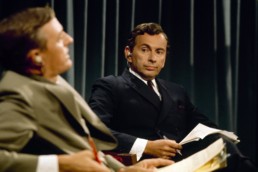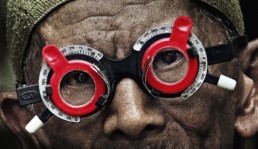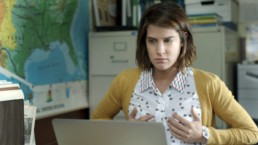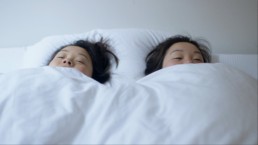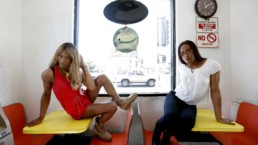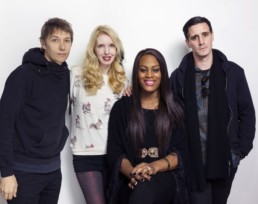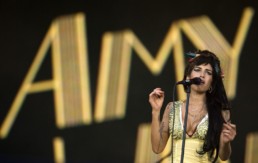Review: 'Best of Enemies'
In the '60s, American society had the utmost confidence in its TV news. It was held to the highest of standards, reporting only the truth with no sidebar commentary or other funny business. By 1968, ABC was considered a laughing stock in the television news world, with jokes like, "The way to win the Vietnam War is to put it on ABC and it'll be canceled in 3-4 weeks."
With the large scale media event of the Democratic and Republican national conventions approaching, coupled with being dead last in the ratings, ABC had nothing to lose and took a chance by featuring two high-profile intellectuals of different political parties, to participate in a live debate with each other. What resulted created a new format for pundit television and news stations everywhere, a format we reproduce to this day.
Academy-Award winning director Morgan Neville (20 Feet From Stardom) and Robert Gordon (Very Extremely Dangerous) bring to the big screen the infamous and provocative debates between Gore Vidal and William F. Buckley Jr in the documentary Best of Enemies. Vidal, a Democrat and cousin to Jackie Onassis, had also gained notoriety from his works as an author. Pushing the boundaries of societal "mainstream," Vidal always liked to shock his audience. His most notable book, Myra Breckinridge, explored pansexuality and "free love," a concept that was seen as taboo at the time.
While the older generations who have lived through these debates may enjoy this film slightly more than millennials, it is an entertaining watch nonetheless.
William F. Buckley Jr., on the other hand, was a cornerstone of the modern conservative movement. A stark difference from Myra, Buckley founded the editorial National Review, and counted Ronald Reagan as a supporter. Two completely different ideologies from individuals who truly despised each other, clearly there was no lack of drama from the very beginning of this relationship.
A majority of the film consists of found footage from the debates, but we also get an exclusive look into the private lives of both of these men. They speak with an eloquence that gives them away as members of the upper class, yet their cunning dialogue and petty insults make them relatable. Sharp banter is flung, all the while keeping fake smiles on their faces. These moments in the film are organically humorous, and provide a magnetic point of interest for the audience.
While older generations who have lived through these debates may enjoy this film slightly more than millennials, it is an entertaining watch nonetheless. Neville and Gordon have managed to make politics funny and interesting for the audience at large. Comparable to the notorious banter between film critics Ebert and Roper, Vidal and Buckley truly were "Best of Enemies."
Best of Enemies opens at The Landmark this Friday.
https://www.youtube.com/watch?v=CzgfQvB2dvA
Review: 'The Look of Silence'
In 2014, director Joshua Oppenheimer's divisive and powerful documentary The Act of Killing, which explored the lives of former Indonesian death-squad leaders, was nominated for an Academy Award. While it ultimately lost out to 20 Feet From Stardom, the film left a lasting impression on many. Now Oppenheimer is back with an equally bold companion piece, coming from the perspective of the victims, in The Look of Silence.
As in The Act of Killing, The Look of Silence's roots stem from the 1965 Indonesian genocide and execution of perceived communists. The film explores the emotional aftermath that has never been publicly expressed. One family in rural Indonesia who lost their first born son to the hands of these "gangsters" had always tried to bury the past, not wanting to confront the real identify their son's killer. However, their youngest son Adi Rukun, an optometrist, takes it upon himself to figure out what exactly happened to his big brother many years ago, exposing the perpetrators along the way.
Adi makes house calls as an eye doctor and confronts some of his brother's murderers. He boldly asks them why they carried out such heinous crimes. It is a tense situation for everyone, including the audience. While Adi confesses to his 100-year-old mother and 103-year-old father that he could forgive the killers if they truly felt remorse, not one of the alleged gangsters demonstrate any sense of responsibility or guilt. "In the afterlife, the victims take revenge," Adi is told.
The Look of Silence brings the ferocity to the big screen with a delicate lens, and this juxtaposition is the reason why I would claim this is one of the best documentaries of the year.
While there are many moments in the film that leave one speechless, a major revelation shocks Adi to the core. He discovers that his uncle was a guard for the "Death Squad," indirectly participating in the killing of his brother. With a heavy heart, Adi shares this information with his mother, which is understandably devastating to her. It is a tough scene to get through with dry eyes.
Oppenheimer effectively captures a stunning moment in history in The Look of Silence. Back on board as executive producers are documentary heavyweights, Werner Herzog and Errol Morris. Cinematically, the look of the film is sharper (likely due to a camera upgrade since his previous film), and the story is more condensed. The graphic nature comes mostly from the killers' own mouths, describing mutilation such as how they cut off women's breasts, killed men by shoving wood up their anus until it hit their throat, and drinking the blood of their victims to, in their words, "stay sane." Oppenheimer reverts back to his unique edit of cutting back and forth between television screen and an emotionless protagonist fixated on the images. Instead of Anwar staring at his performance in The Act of Killing, it is now Adi watching an interview with two murderers describing how their victims "screamed, cried, and begged for mercy."
The Look of Silence is far from a light film, with the weight of all the victims who went without a voice for years, resting on it's shoulders. Oppenheimer has done a groundbreaking job in exploring an act of terror not widely known, and getting into the mindset of the killers to try to understand "why." He then comes full circle, focusing on the innocent victims and how they have been affected. The Look of Silence brings the ferocity to the big screen with a delicate lens, and this juxtaposition is the reason why I would claim this is one of the best documentaries of the year. It is not rash to call this film another Oppenheimer masterpiece.
The Look of Silence opens today with a national rollout to follow.
https://www.youtube.com/watch?v=aA_ZHAs4M9k
Anders Holm on 'Unexpected'
I meet Anders Holm at the SLS Hotel for our exclusive interview about Unexpected, the new indie flick starring Holm and Cobie Smulders of How I Met Your Mother fame. Holm, himself a notable comedian for his show Workaholics (in which he co-stars, writes, and directs), is quick to crack a joke (If only his character "John" in the film was as entertaining as Anders is in real life). With a monotone cadence, Holm rides the line of being either sarcastically hilarious or completely serious. It is a style of comedy which I'm personally a huge fan of, so our interview is no doubt a very fun 15 minutes. We initially cover the film, but then can't help digressing for the rest of the interview to other important subjects such as: proper telemarketing etiquette, his daily routine, and his dreams of wearing a speedo one last time. We begin:
How did you become attached to the project?
I became attached after reading the script and falling in love with it, and then meeting Kris Swanberg. Not falling in love with her, but loving her and wanting to work with her. So between the script she wrote and then just Kris herself, I was like I wanna be a part of this.
In Unexpected, you play the perfect boyfriend. When fans of Workaholics see you in this role, what will they say?
They're gonna say, "Woah, Ders is a total bitch in this movie, but I like him." You know as I get older, and I am, it's no longer like "fresh out of college." It's more like oh, this guy's in his 30s and just had a baby and proposing and getting married. Hopefully my characters can evolve with my actual self.
Is that something you want to do, take on these more "serious" Hollywood roles?
No I mean it's just like realistic. It's funny, I was on set two seasons ago when I was 31 and we [Adam Devine, Blake Anderson] were chasing these girls who were underage and couldn't buy beer, and one of the actresses was 17 playing 20, and I was 31 playing 27 or whatever. It was like, alright, let's just start playing our age. What are we doing here? It's bizarre.
At least it's not the other way around, you're not aging yourself.
But isn't that society? Isn't it not right either way? I'm kidding. There's double standards and there always will be.

What was working with Cobie Smulders like?
Cobie is awesome. She's easygoing, she knows her lines. She seems like she could be a diva, like, "This girl's got it all," but she's not. She's the most fun and also just like, good. There's nothing like showing up on set and acting across from someone and thinking, "Oh, they're way better."
Did you go with the film to Sundance and SXSW?
I went to Sundance. Went to the dance, the Sunny D. Walked around with Chris Webber, who's a producer on the movie, and watched some guy pass by and say, "Was that R. Kelly?" It was very funny. I had never done Sundance before and it was just cool.
What's your daily routine?
Well now I've got a kid, so the child wakes me up. I used to wake up to Alice in Chains "Here Comes The Rooster," on my phone, but now I wake up to a 19-month-old down the hall going, "MOM. MOM. MOM" for like 10 minutes before we're like, "We gotta get up." That's zero exaggeration. It's deep and it's not "Mama," it's not "Mommy," it's "Mom."
He sounds like a teenager.
Yeah it's weird. So that gets me out of bed and then I either try and do a five minute workout or I get out the door and go to work and write all day with my best friends on Workaholics. Then I go home and open the door and the kid's like "MOM."

I'm sure with a kid you've had to master the art of fitting things in with a limited amount of time.
Yeah, well it's more of I've given up my own life, minus work. I did have some hobbies I used to do, and they no longer exist.
Would you say you're most productive in the morning, afternoon, or night?
Night, which I can't do anymore. I'm a total night person. If I was left to my own devices I would become a vampire and stay up until 4 a.m. But when you've got a kid you can't do that because you've gotta be up at 7 a.m., so I've taken to writing at like 10, maybe 11 a.m. Then I just work during the day. I don't like it as much but what am I? A child? It's time to go to work.
What is your process for memorizing lines?
Well Workaholics is cheating because two things: We wrote the episodes so I was there and read the script a bunch of times. I also have the advantage of being able to say whatever I want anyway 'cause it doesn't matter. When you get to other people's sets it matters a little more. I don't know what I do [learning lines], I'm not the best, but Jillian Bell on Workaholics taught me this thing where if you hand-write out all of your lines and also the other person's lines, it will help you embed it into your brain. It works, but I've got brain damage or something. It's never gonna happen.
You're also involved in improv comedy.
I took a couple classes after Workaholics just 'cause I was like, bored, and wanted to make sure I could still act. When you're insulated with the guys who I've just been shooting videos with and you're like "Oh other actors are going to be coming to set," it might be good to just get out there and sharpen my tools.
So when you are on other people's sets, do they allow you to improvise?
It varies, but when I did The Mindy Project we would improvise a lot. I would usually let Mindy [Kaling] go off the page before I did. It's her house, I'm not gonna walk in there and tread mud. But then at the same time it's better to beg forgiveness than ask for permission. I've begged for forgiveness a whole bunch.

If you could write/direct your next movie, featuring you, what would that be?
That's what my manager is telling me and I don't know what it is. How about it's a guy whose back is up against a wall, so he puts on his speedo and tries to make the Olympic trials.. and doesn't.
You already have the speedo experience*, right?
I do have the experience. I might as well, one last time.
What's been the worst job you've had in a non-acting context?
I mean, I did telemarketing and so did Adam DeVine. What I did was tele-fundraising. Instead of calling you and saying, "Hey I've got a product," I would say, "Hey, there are some whales that are getting murdered off of the coast of Japan. Do you want to give money to make those whales not murdered?" It sucks. Asking people for money, on the phone, sucks. You're hooked up to a computer so as soon as a call is over and you hang up, it dials another one.
Ok, so I have to ask, what is the polite way to say "No thank you" to these calls?
Yeah exactly! So now when I get one of these calls, I let them get out their main thing, and if they do say "How are you," I'll say, "Hey I'm good and I appreciate your call but I'm not interested. Thanks and good luck." You've gotta be sweet. I don't know why people... I think it's a power thing. If you have no power in your day-to-day life except for when someone calls and you can just shit on them, people will. But my life's ok so I can just talk them down.
*Anders was a varsity member of the swim team at the University of Wisconsin-Madison.
For our review of Unexpected, click here.
Review: 'Unexpected'
30-year-old Samantha Abbott (Cobie Smulders) looks like she has it all, a doting live-in boyfriend, a nice house in the suburbs, and a steady job as a high school teacher at an inner-city Chicago school. As news circulates that the school will be closing due to budget cuts, Samantha seems relieved to be able to pursue another, more fulfilling job at a local museum. She soon finds, however, that her plans must now take a back seat when she realizes she is pregnant.
Instead of embracing this news, like her boyfriend John (Anders Holm) does, Samantha is anything but optimistic. She continues to teach despite the ever present morning sickness, which does get the better of her one day as she ends up puking in front of the entire class. But it is then that she notices another pregnancy in her classroom. A high school senior Jasmine (Gail Bean), who is one of her most promising students.
The result is a special bond that forms between Samantha and Jasmine that far succeeds the typical student/teacher relationship. From prenatal yoga to sharing milkshakes, they embark on the journey of unplanned pregnancy together, sharing their concerns, their surprises, and their joy.
As far as performances go, Smulders does a fine job of working with the material she was given.
While the premise is interesting, Unexpected, a film from director Kris Swanberg, lacks conflict from the very beginning, leaving our protagonist, Samantha, extremely flat. There is no real backstory to her character and she goes through virtually no real struggles, yet we are supposed to feel sympathy for her? Sure the pregnancy was unplanned, but her boyfriend is overtly supportive, literally proposing to her over a pancake breakfast the day after he learns the news. And from the looks of her "danish modern" furnished apartment, Samantha appears to be sitting comfortably in the middle class.
If there is anyone we should feel sympathy for it's Jasmine, a pregnant teenager whose boyfriend left her, and who spends her nights working in a grocery store to help her family. With the support of Samantha, Jasmine even pursues college and her drive is commendable, while Samantha on the other hand, complains that her pregnancy is holding her back from her "dream job," and claims that she does not want her identity to be "Only somebody's wife and mother." It's doubtful that the film's intention was to spotlight the stark contrast between the class difference and racial treatment in Chicago, but that is exactly what it does. In this film, the ironic phrase "White People Problems" rings true in a cringe-worthy way.
As far as performances go, Smulders does a fine job of working with the material she was given. Had there been more depth to the script, I'm sure she would have given Samantha more layers. Holms has very limited screen time, but what he does bring is solid. Ultimately, the biggest fail seems to be the script, and as we know, one cannot have a good film without a good screenplay. Expect Unexpected to have a limited shelf life.
Unexpected opens at Sundance Cinemas and the Laemmle Playhouse 7 this Friday.
https://www.youtube.com/watch?v=x9ANgqpiIzU&feature=youtu.be
Review: 'Twinsters'
Anaïs Bordier and Samantha Futerman were complete strangers on February 22nd, 2013. Bordier was a fashion student from Paris studying in London, and Futerman was an aspiring actress in Los Angeles. On February 23rd, however, everything changed.
In what can only be described as a real life Parent Trap situation, Twinsters tells the incredible true story of identical twins who were separated at birth, only to discover each other through social media 25 years later.
It was Anaïs who watched a YouTube video starring Samantha, and couldn't help but notice the striking similarities between each other. Growing up in France as an only child, Anaïs was rightfully confused, but curious. She contacted Samantha on Facebook, not knowing where it would go, or what it even meant.
She contacted Samantha on Facebook, not knowing where it would go, or what it even meant.
Soon the girls realized that they had more in common than facial features. They were both adopted out of South Korea as babies, and they shared the same birthday, but were never aware of being a twin. Both of their adoption records made no mention of a sister, but in their hearts they knew something was missing. The girls took it upon themselves to get an official DNA test to prove the validity of their assumptions, and were elated to find out the results.
A heartwarming and emotionally moving film about love and family, Twinsters takes the audience on an incredible journey. We see first hand the impact of nature vs nurture, and the power of the internet. From the first sighting on YouTube, to the initial messages on Facebook, we see their relationship evolve quickly. Awkward first Skype sessions turn into inside jokes and witty banter in texts. The girls even make a point to visit each other in their respective countries, bringing along their friends and family who also couldn't believe the situation they found themselves in.
Twinsters has an honest intimate feel, as if we are reading their diary. Samantha took to making this film as a creative outlet, most likely as a way to process this major life event. Not only is her directorial debut a success– winning a Jury Award at the SXSW Film Festival earlier this year– her approach to making this film and its ultimate execution is very inspiring for future documentary filmmakers. So if you're in the mood for an uplifting family story, definitely check out Twinsters.
Twinsters opens in Los Angeles at the ArcLight Hollywood this Friday.
https://www.youtube.com/watch?v=1txduZwL2Yg
Kitana Kiki Rodriguez and Mya Taylor on 'Tangerine'
Mya Taylor and Kitana Kiki Rodriguez arrive to their interview at the Redbury Hotel full of confidence, and with good reason. The amateur actors have been receiving nothing but praise for their work in Sean Baker's micro-indie Tangerine, in which both Rodriguez and Taylor play prostitutes on the notorious Santa Monica and Highland junction of Los Angeles. With two beautiful and poignant performances, it's hard to believe that this is their first time on screen. Mya Taylor, both in the film and in person, is the quiet leader of the group. She speaks softly and carries herself with poise. Kitana Kiki Rodriguez, on the other hand, is more of the sharp-tongued firecracker, I notice her subtly tap her acrylic nails together while forming her responses. Both women are fiercely strong, there's no denying that, and during our interview they talk about the struggles of being trans women of color, the idea of falling in love, and the one scene they almost didn't shoot. We begin:
As first time actors, were you nervous signing on to this project?
MT: I'm pretty confident in everything that I do, I'm not nervous before interviews of anything... No, you know what? That's a lie.
Laughter
KR: Thank God, 'cause girl! I was gonna be like, 'I don't know about you...'
MT: I just did another movie the week before last and I was nervous not about the performance, but about the voice of the character because she has a very [raises her voice] "distinct voice like this," and I had to talk like that the whole film. I was very nervous because I don't sound like that, my voice is much lower and sexier.
Kiki, is acting what you want to do now?
KR: I did musical theater for one semester in college while majoring in psychology. I've always had an acting bug, but I didn't want to tell anybody about it. [Getting cast in Tangerine] I was like, 'Stuff like this doesn't happen every day.' I didn't believe it. We had filmed the whole movie and got paid and I was like 'Ashton Kutcher is somewhere.'
Laughter

As an Angelino, the locations (Santa Monica & Highland) in the film were perfect.
KR: Yeah, this is the area where some of the transgender community is located and where they might be living. Life really imitates art as far as [the location]. It was as realistic as Sean [Baker, director] could get.
MT: We've been around all of those people for quite some time, so it really wasn't hard to "act like the scenery." It was very important for many reasons. I guess I have to throw this in if you know the stories about transgender street workers– and that's what most of that area consists of– and me personally, I had applied for 186 jobs in one month and I did 26-27 interviews that month, 3 a day. I did not get one job, and I actually caught people discriminating against me just because I'm trans. Not so much because of the way I look of course [coyly smiles], but to see my ID and still see that it says Jeremiah instead of Mya. It leads to a lot of transgender girls doing street work, and that's what I want people to see in this movie. It's very, very serious.
Tangerine is coming at a perfect time, with Orange is the New Black's Laverne Cox and Caitlyn Jenner making major headway in the trans community. What do you want people to feel as they leave the theater?
MT: I want people who are either trans or who can just relate to us, to know that they're not alone.
KR: I want them to get an understanding of the trans community and a small part of who we are, and a realization of what some people go through. Another thing I hope people get from it is if they see something they don't like, they'll change it. It's a blessing to not only be trans but be trans and a minority and have the opportunity to show people a different side of the world, our life from that point of view!
MT: And it's very important for that area. That area is very... iconic! I've seen so many people come and go, fighting for their lives and even a few people get killed. It makes you wonder, 'Why were they out here doing this?' I just told you why.
Do the other people in the film actually work in that area?
MT: Every person that appeared in the film wasn't necessarily a sex worker. We're not even sex workers. But, there were a few, I'm not going to say any names.

What were your thoughts on seeing the completed film?
MT: I thought it was funny.
KR: I thought it was beautifully edited and shot. When you have that much passion, you see why people do the things they do. It really impresses me that people have that much talent.
This was one of the most buzzed-about films at Sundance, did you have any expectations about its success?
MT: Haha, no not at all! I thought I was just going to be doing just a regular project, I had no idea that it was going to be this. [Before I was cast] I was sitting in the courtyard and I saw Sean and Chris Bergoch [co-writer/co-producer] approach many other people other than me and they we being so shady and so mean, I was like, 'Who the... are you?' Then they came over to me and I was very sweet to him because I'm naturally a very sweet person, and I feel like being sweet gets you a long way!
Laughter
And here I am today. Sucks for [the other girls].
The film is an interesting look at love vs lust in Los Angeles...
KR: There's an interesting dynamic of love in the trans community, and when you're in the area surrounding the film, people there have an interesting idea of love. I'm a goodie-goodie two shoes now, but being younger and dealing with love and being trans, I had guys that didn't know what to do. There was gay, straight, but then what do we do with you [trans]? They'd say, 'I don't want to hold your hand, that's too gay. I don't want to kiss you, that's too gay.' I thought that doing "other things" must be love. One day I talked back to myself about what I was doing and thought that didn't sound right. I shouldn't be getting treated that way. I should be getting treated the way they would treat anybody else. That's what changed my mindset and I became the goodie-goodie two shoes I am now. I took out all my piercings, I never had tattoos. [Love] is a weird experience for girls like us.

Can you talk about the final scene? That must have been hard to do.
MT: You guys are so cruel.
Laughter
Sean brought the idea to us and immediately we said no because I don't come out of my 28-inch hair.
KR: We don't come out of our "hair-acture."
MT: Then I thought about it, and knew it would be really, really sweet because she's supposed to be my best friend and she is mine. This [pointing to Kiki] is my bitch. If she fights, I fight, and that's how we have been.
KR: I didn't complain about nothing the whole time until that scene came. [On set ] I wanted everybody to be quiet and nobody to see. But I knew I had to be a trooper. I was so not ready for it, for any of that scene. However, it shows that when people go through any act of unkindness it can bring people back together because there's always that closeness [between friends].
Your characters are so strong throughout all of their hardships. Are there similarities between them and you?
MT: When you're going through everything that these girls are going through in the film, you have to be positive. All the time. I personally had a pretty hard life ever since I was 18 all the way up to 23, and I'm 24 now. I just feel like you have to have fun, you can't let [negativity] get the best of you. All of the personality that's inside the movie is actually how we are. It's just for this interview, you have to present yourself in a certain way, haha.
KR: When people live a certain lifestyle like the girls in the film, full of negativity, you have to have humor. [You don't need anything] but a smile. By being an ostracized person, you have nothing but to make joy out of what you want to do.
For our review of Tangerine, click here.
Director Sean Baker & Writer Chris Bergoch on 'Tangerine'
Sean Baker is no foreigner to the world of independent film, and with his unique thematic interest in marginalized characters and subculture, he is certainly making a name for himself. In his 2012 film Starlet, starring Dree Hemingway as a whimsical porn actress living in the valley, he broached the topic of sexuality and empowerment without judgment. This same approach is seen here in Tangerine, a raw look at a day in the life of trans women trying to make sense of the world. The film not only explores the underbelly of one facet of the Los Angeles nightlife, it cinematically takes on a new-age aesthetic, relying solely on iPhones. During our interview with Baker and co-writer/ co-producer Chris Bergoch, we talk about how they discovered Mya Taylor and Kiki Rodriguez, shooting a feature film on an iPhone, and how the final scene left them emotionally drained. We begin:
Can you talk about why you chose the locations you did?
SB: Well I wanted to stay geographically accurate. I think that stems from [Martin] Scorsese in Taxi Driver... It's just something that, if you know the city, you want audiences who also know the city to appreciate the fact that you did that. We only break [from Los Angeles] one time and that's the... oh I won't even tell you! We were able to get these locations for next to nothing, which was quite a feat. I knew I couldn't make the film if we didn't have Donut Time. Donut Time is such a landmark.
CB: When you see the Donut Time scenes in the film, those are actual customers. We couldn't own it, so we just had to chase after them with release forms.
Were there people saying, 'No way, I don't wanna be in your film'?
SB: They didn't say no way, but they tried to get some dollars out of it.
I thought the bus scene was fantastic.
CB: Do you remember when Dinah [Mickey O’Hagan] falls when they're getting on the bus? That's a real fall. She just kept going with it, she didn't break character.
SB: I thought that she was over at that moment. I couldn't run after her to see if she was ok because the bus took off. I was about to vomit, I saw her hit the ground so hard. I think it was one of our producers on the bus who said, 'I think we're gonna have to go to the hospital.' It was scary.
CB: Yet perfect for the scene.
SB: The first thing Mickey said was, 'You better use that.'

Being first-time actors, were Mya and Kiki nervous on set?
SB: We are using a device that they own themselves. Between takes they would whip out their own smartphones and take selfies, there was no intimidation factor. Usually for first time actors, it takes about a week for them to get over that hump of having a camera in their face. In the past I've seen how seasoned actors usually help coach [novice actors], but in this film, no. From the first day Kiki and Mya were just as professional as everybody else.
A lot of people are calling Tangerine "The movie shot on an iPhone". Is this something you embrace, or would you rather have it be remembered for something else?
CB: It started as a budgetary thing and we didn't make that relatively well-known before Sundance. After people saw the premiere in January and saw the credits, that's when that [iPhone] buzz started. I know our fear at first was that we didn't want to tell people, because it would be read as a gimmick. But it absolutely wasn't. Sean's done five features and I think you were out of favors at that point and we all had an iPhone 5s in our pocket. We did a lot of tests with the Moondog Labs anamorphic adapter and I think that's what convinced Sean.
SB: Yeah that and an app called Filmic Pro which allowed us to shoot 24 fps.
What were you looking for during casting?
SB: I was extremely lucky to find Mya Taylor. Not only is she incredibly talented, but she also had that enthusiasm that I was looking for. She was our passport to that world. The only way to respectfully do that was to collaborate with someone from that world, and that was Mya. Mya was always there– we would meet regularly at the Jack in the Box on Highland and just hear her stories. She would bring people and introduce us regularly. That's how we met Kiki. Kiki came in and sat down next to Mya– Chris and I were sitting across from them in the booth– and we knew, there is our dynamic. The complimented each other and they were funny, and finishing each other's sentences.

Were there moments in the script, just in terms of transgender women, where either one of them said "No, this isn't the way it should go"?
CB: Interestingly enough, after Mya Taylor greeted us with open arms she did have a couple of requests. She wanted us to make it funny, but she also wanted brutal realism which is a very interesting tightrope to walk.
SB: I think saying that to us really dictated the whole style of the movie. They were very much involved in all stages of production, except in post-production, Mya decided that she didn't want to see anything until we had a cut. Kiki would actually come by my apartment. Every time I had 10 minutes cut she would come by and give me her notes.
Can you talk about the final Donut Time scene?
SB: That was one of the only things Chris and I went in to with a vision of [when we set out to make this movie]. We went in there not really knowing what the story was yet, thinking it would take place on one day because of budgetary reasons, and maybe two people were trying to find each other but don't know if this will be a love story or a friendship story or a revenge story, but we do know that all of the characters have to converge at the very end at Donut Time. It is inspired by [director] Mike Leigh (Secrets & Lies, High Hopes).
How did this film leave you upon its completion?
SB: Very emotionally draining. We're focusing on the most vulnerable group of people, I mean they're trans women of color who are sex workers, their lives are not great. They're out there because they have no other choice, dealing with discrimination, hardship, violence. After we walked away and started editing, the weight of it came down.
CB: We had an emotional day when we shot the laundry room scene, the last scene of the film.
SB: They were very brave to do that scene [removing their wigs] and we could only shoot that one time, that was a one take. We had to have PA's in the parking lot making sure nobody could see in to respect their privacy. The bravery that they displayed and also their trust, I couldn't ask for more.
For our interview with actor James Ransone, click here.
Review: 'Amy'
I remember the first time I heard Amy Winehouse. It was 2007 and I was a sophomore in college. I was hanging out in my dorm room in-between classes and jumped on my computer to kill some time. Links to a David Letterman performance flooded the Internet, and upon clicking one of the links I was immediately drawn to this skinny, retro-soul jazz singer in the polka dot dress. "Ladies and Gentlemen, Amy Winehouse," Letterman exclaimed. Then she sang "Rehab." In that moment, it was obvious that this girl was something special, but even then I knew that something wasn't right. I think the world knew too.
Director Asif Kapadia brings Amy Winehouse's infamous reputation and story to the big screen, but this time in Amy's own words. The film relies solely on archival footage, most of which has never been released to the public before, as well as previously unheard songs and extensive voice over interviews with her family, friends, and management team.
It's a heartbreaking watch; as brilliant an artist as she was, her troubled relationships and addictions led her down a dark path of self-destruction that she was unable to escape from.
Her voice is like a fierce wall of sound, evident by her rendition of "Happy Birthday" at 14. All Amy wanted in life was to be a jazz singer, playing in small nightclubs to an intimate group of people. She caught the attention of the jazz community almost immediately with her unforgettable voice and lively personality. She was an authentic artist, writing her own songs and giving in to extreme vulnerability during the songwriting process. The results of her hard work earned her six Grammys and legions of fans around the world.
The signs were there all along, as clear as they could be. Of course this is all in hindsight, which makes watching her rise and fall in the public eye all the more disturbing.
However, Amy didn't want the attention, she just wanted to sing. In 2003 she gave an interview saying that she would never be famous. She seemed relieved at the thought of anonymity, adding, "I couldn't handle fame." How haunting those words seem now.
Kapadia doesn't sugar coat any of Amy's struggles, giving the audience a no holds barred look into the troubled life of an icon. At 9, she had already cut her wrists. When she was 13, she was diagnosed with depression. At 15, she had developed a full-fledged eating disorder, which her mom assured her she would grow out of. She never did. By the time she met Blake Fielder-Civil she was already drinking heavily, having to be wheelbarrowed home many nights, but it was Blake who introduced her to heroine, crack, and cocaine.
Her physical demeanor deteriorates as she becomes more off-course mentally, and watching her change so rapidly in front of our eyes is pretty graphic. As her weight plummets, her hair gets higher and eyeliner gets thicker. The sparkle in her eyes that we see in her early years of singing jazz is gone. What's left is emptiness and sadness, a shell of her former self. Even after her Grammy win for Record of the Year, she admits to a friend, "This is so boring without drugs."
What makes this film great is the level of trust Kapadia is able to reach with everyone involved in the film, therefore giving Amy its unique introspective. The feeling of guilt everyone expresses for how things unfolded is powerful. Looking back, we can spot so many chances for her to turn her life around, if only there was someone strong enough to tell her "No." How could no one have prevented this? The signs were there all along, as clear as they could be. Of course this is all in hindsight, which makes watching her rise and fall in the public eye all the more disturbing.
The reaction in the screening room was unlike anything I have experienced before. I lost count of the number of audible gasps coming from the people around me. The older man sitting next to me was discretely trying to wipe tears from his eyes, but his uncontrollable sniffing gave him away. The room literally shook when she sang, but you could hear a pin drop when she stopped. Fans of the singer or not, it would be hard to leave the theatre without being emotionally moved and distraught when thinking about what could have been.
Amy Winehouse is a once-in-a-generation talent, and this documentary confirms it. The film runs over two hours, but I would have gladly sat for longer. A majority of her music is autobiographical, and after understanding the context of her lyrics and what went on behind the scenes, it will be hard to listen to her songs in the same way. What were once fun radio hits and karaoke choices, "Rehab" and "Back To Black" are just some of the songs that are heartbreaking for me to hear now. However, for as heavy-handed as this film comes across, we are left remembering a brilliant artist. It's been almost 4 years since her untimely death at the age of 27, but with each passing year her musical legacy only continues to grow stronger.
Amy opens this Friday at the ArcLight Hollywood & Landmark Theaters with a national release July 10th.
https://www.youtube.com/watch?v=_2yCIwmNuLE

